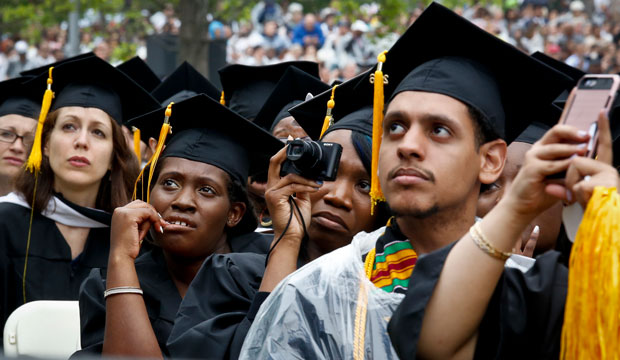Students in Africa and South America have been denied visas to study in the U.S. at disproportionately higher rates than students from elsewhere in the world, according to a report published Wednesday.
The number of F-1 student visa denials has risen from 2015 to 2022, according to research by Shorelight and the Presidents’ Alliance on Higher Education and Immigration, published on the Higher Ed Immigration Portal, which provides data and research related to immigrant and international students.
Of all international students applying to U.S. universities and colleges, visa denials for South American students more than doubled in the last decade, but denial rates for students across Africa, with the exception of four countries in southern Africa, remain the highest of all regions over the 7-year time period.
Researchers analyzed data of F-1 visa refusals and approvals based on statistics from the U.S. government and data on the flow of international students globally from the Institute of International Education and global data sources, such as the United Nations and World Bank.
In 2015, F-1 student visa denials were concentrated among African students — with the exception of countries in southern Africa — South Asia and parts of the Middle East, according to the report. Following the pandemic, denials increased globally except in Australia, China, Brazil, South Africa and select European countries. The starkest increase was for South American students, whose F-1 visa denial rate jumped from 10% to 24% in the eight-year period, according to the analysis.
A spokesperson for the State Department, which issues visas for international students, told NBC News that in 2022, it “issued the most student visas in a year” since 2016. In terms of African students, the State Department approved 30,781 F-1 visas in total to applicants from African countries — more than any of the previous six fiscal years, the spokesperson said.
Visa applications are evaluated on a case-by-case basis. The spokesperson added that some students may fail to meet the requirement surrounding “the presumption of immigrant intent,” meaning they may not have demonstrated sufficiently strong ties to their home countries to qualify for a nonimmigrant visa.
Researchers from the Presidents’ Alliance said that there is a long-held assumption by the general public, colleges and international students themselves that F-1 visa denials occur based students on being ill-prepared for the rigorous visa interview or not having enough funds for a U.S. education. But even when students from sub-Saharan Africa are admitted to graduate programs in the U.S. and have secured adequate funding, 40% were still denied a student visa, the report found.
Over half of all African applicants for F-1 visas were denied in 2022, compared to around a third of Asian applicants and just 9% of European applicants, according to the report.
The researchers estimated that the disparity equals about 92,000 “missed opportunity students” who were potentially eligible to study in the U.S. but could not.
Rajika Bhandari, a senior adviser at the Presidents’ Alliance, said the colleges that offer students admission should determine whether they are academically prepared to study in the U.S., not the consulate.
Despite the disproportionately high visa denial rates for most African students, the rate at which African students are enrolling in U.S. universities and colleges is outpacing other international students, demonstrating a high demand for a U.S. education from African students, the researchers noted.
“The U.S. is losing out on qualified future talent from Africa,” the researchers wrote, adding that if the trend of F-1 visa denials for African students continues, other countries will compete for the emerging talent pool from the largest continent.
“A lot of people may not realize how important it is strategically for the United States to make sure that we’re welcoming students from around the globe. It’s been a major pillar of our security, our foreign policy and our economic progress,” said Jill Welch, a senior policy adviser at the Presidents’ Alliance. “The inability to secure a visa should never stand in the way of qualified students being able to pursue an educational degree in the U.S.”

